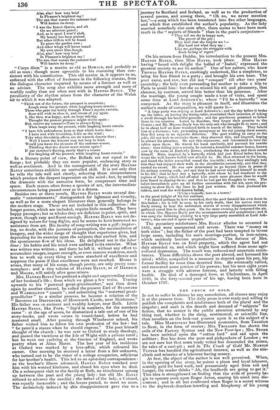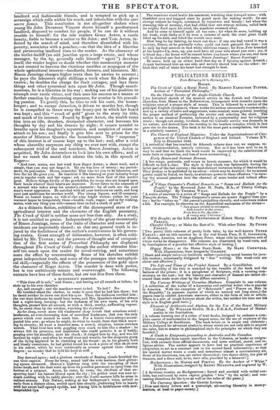THE CROCK OF GOLD.
IF not to suffer in silence be any consolation, all classes may enjoy it at the present time. The daily press is ever ready and willing to publish the complaints and misfortunes both of the plural and the singular; and such is the dearth and demand of "subjects" for fiction, that no sooner is the public attention attracted by any thing real, whether in the slang, sentimental, or scientific line, than novelists on the look-out pounce upon it as the subject of a tale. Miss MARTINEAu has illustrated economics, from Taxation to Rent, in the form of stories; Mrs. TROLLOPE has shown the evils of the Factory System and the New Poor-law ; Mrs. STONE has been satirical upon the "cotton lord" and sad upon the milliner; Box has done the poor and pickpockets of London ; we are not sure but that some ready writer has descended the mines, for tales of a coal-pit ; and in The Crock of Gold Mr. MARTIN TUPPER has handled the agricultural interest, as well as the mile, chiefs and miseries of a labourer having money.
At first, the object of the author is not well perceived. When, in the opening of the story, he paints a pious and loyal labourer, scantily paid for hard work, and prematurely aged from toil and hunger, the reader thinks "Ah, the landlords are going to get it." This idea is strengthened on finding that the evils of poverty be- gin to operate even upon Roger Acton, souring his mind into dis- content ; and is all but confirmed when Roger is a secret witness to the daybreak-drunken-brawling and blasphemy of his young
landlord and fashionable friends, and is tempted to pick up a sovereign which rolls within his reach, and infects him with the auri sacra fames. This conclusion is not altogether shaken when young Sir John Devereux Vincent shows himself a goodnatured landlord, disposed to comfort his people, if he can do it without trouble to himself: for the tale renders Grace Acton, a rustic beauty, liable to become a suitor to Sir John ; and Tom Acton, in- fected by the march of mind, and therefore dissatisfied with his poverty, associates with a poacher,—so that the idea of a libertine and persecuting landlord rises to the reader. As the character of the butler-bailiff' (an odd junction upon a large estate, and whose manager, by the by, generally calls himself " agent ") develops itself, the reader begins to doubt whether this nondescript monster is not created to become the vicarious sacrifice or scapegoat of the whole agricultural interest—landlords, farmers, and labourers. Mr. Simon Jennings charges higher rents than he carries to account ; he pays the labourers eight shillings a week when Sir John gives twelve; he doubles the charge for their cottages, and lays these things and other tyrannical acts upon Sir John. Though sancti- monious, he is a libertine in his way ; making use of his position to triumph over rustic virtue, and then uses his success as a means ot further exaction by threatening exposure, for avarice is his prevail- ing passion. To gratify this, he tries to rob his aunt, the house- keeper; and to escape detection, is driven to murder her, though he is compelled to throw away the honey-pot in which her hoard was kept ; and this "crock of gold" gives to the story its title, and much of its interest. Found by Roger Acton, the wealth turns him into an idle, drunken, dissipated character, and harasses his thoughts by day and his dreams by night ; it causes scandal to breathe upon his daughter's reputation, and suspicion of crime to attach to his son ; and finally it gets him sent to prison for the murder of Mistress Quarles the housekeeper. The " suspense" of this interest is of course kept up to the last ; and, after a trial whose absurdity surpasses any thing we ever met with, except the subsequent trial of the real murderer, Simon Jennings, Acton is acquitted, Sir John determines to look into his own affairs ; and at last we reach the moral that adorns the tale, in this speech of Roger— "And now, mates, one last word from Roger Acton; a short word, and a simple, that you may not forget it. My sin was love of money : my punish- ment, its possession. Mates, remember Him who set you to be labourers, and love the lot He gives you. Be thankful if His blessing on your industry keeps you in regular work and fair wages : ask no more from God of this world's good. Believe things kindly of the gentlefolks, for many sins are heaped upon their heads whereof their hearts are innocent. Never listen to the counsels of a servant who takes away his master's character : for of such are the poor man's worst oppressors. Be satisfied with all your lowliness on earth, and keep your just ambitions for another world. Flee strong liquors, and ill company. Nurse no heated hopes, no will-o'-the-wisp bright wishes: rather let your warmest hopes be temperately these—health, work, wages : and as for wishing, mates, wish any thing you will—sooner than to find a crock of gold."
As a didactic fiction, exhibitive of the distempered state of the agricultural interest and the character of the English peasantry, The Crock of Gold is neither more nor less than silly. As a story, it is not entitled to praise. Independently of the gross monstrosity of Simon Jennings, some of the traits of character and some of the incidents are improbably absurd ; so that any general truth is in- jured by the foolishness of the author's contrivances in his govern- ing events. Great strength of delineation, however, is often exhi- bited by Mr. TUPPER ; and the powers of thought and of composi- tion of the first series of Proverbial Philosophy are displayed throughout The Crock of Gold; though the author obtrudes him- self too much upon the reader for novel-writing, and sometimes mars the effect by overstraining. Some of his sketches exhibit great independent truth, and some of the passages nice metaphysi- cal skill,—especially the effects of the possession of the gold upon the character of Roger Acton. The murder is done with power, but is too ambitiously minute and overwrought. The following extracts have less of these faults, but are not free front them.
A MURDERER'S REMORSE.
"This time all is safe," said Simon ; and having set all smooth as before, be stole up to his own chamber. Ay, safe enough : and the murderer went to bed. To bed ? No. He tumbled about the clothes, to make it seem that he had lain there : but he dared neither lie down nor shut his eyes. Then, the darkness terrified him : the out-door darkness he could have borne, and Mrs. Quarles's chamber always had a night-lamp burning: but the darkness of his own room, of his own thoughts, pressed him all around, as with a thick, murky, suffocating vapour. So, he stood close by the window, watching the day break.
As for sleep, never more did wholesome sleep revisit that atrocious mind : laudanum, an ever-increasing dose of merciless laudanum, that was the only power which ever seemed to sooth him. For a horrid vision always accom- panied him now : go where he might, do what he would, from that black morn- ing to eternity, he went a haunted man, a scared, sleepless horror-stricken wretch. That livid face with goggling eyes stuck to him like a shadow : he always felt its presence, and sometimes also could perceive it as if bodily, peeping over his shoulder, next his cheek ; it dodged him by day, and was his incubus by night ; and often he would start and wrestle, for the desperate grasp of the dying appeared to be clutching at his throat: so, in his ghostly fears and bloody conscience, he bad girded round his neck a piece of thin sheet-iron in his cravat, which he wore continually as armour against those clammy
fingers no wonder that he held his head so stiff. • • • •
Day dawned apace; and a glorious cavalcade of flaming clouds heralded the sun their captain. From far away, round half the wide horizon, their glitter- ing spears advanced. Heaven's highway rang with the trampling of their horse-hoofs, and the dust went up from its jewelled pavement as spray from the bottom of a cataract. Anon, he came, he came, the chieftain of that on- spurring host! his banner blazed upon the sky ; his golden crest was seen be- neath nodding with its ruddy plumes; over the South-eastern hills he arose in radiant armour. Fair Nature, waking at her bridegroom's voice, arrived so early from a distant clime, smiled upon him sleepily, gladdening him in beauty with her sweet half-opened eyelids, and kissing him in faithfulness with dew-
besprinkled lips. • •
The murderer stood beside his casement, watching that tranquil scene : with bloodshot eyes and haggard stare he gazed upon the waking world; for one strange minute he forgot, entranced by innocence and beauty : but when the stunning tide of memory, that had ebbed that one strange minute, rolled back its mighty flood upon his mind, the murderer swooned away.
And he came to himself again all too soon ; for when he arose, building up his weak, weak limbs as if he were a column of sand, the cruel giant Guilt lifted up his club, and felled the wretch once more.
How long he lay fainting, be knew not then : if any one had vowed it was a century, Simon, as he gradually woke, could not have gainsaid the man : but he only lay four seconds in that white oblivious trance; for Fear, Fear knocked at his heart—Up, man, up, you need have all your wits about you now; see, it is broad day ; the house will be roused before you know where you are, and then will be shouted out that awful name, Simon Jennings! Simon Jennings ! He arose, held up on either hand that day as if fighting against Amalek ; despair buttressed him on one side, and secrecy shored him on the other : be- hind that wall of stone his heart had strength to beat.



























 Previous page
Previous page